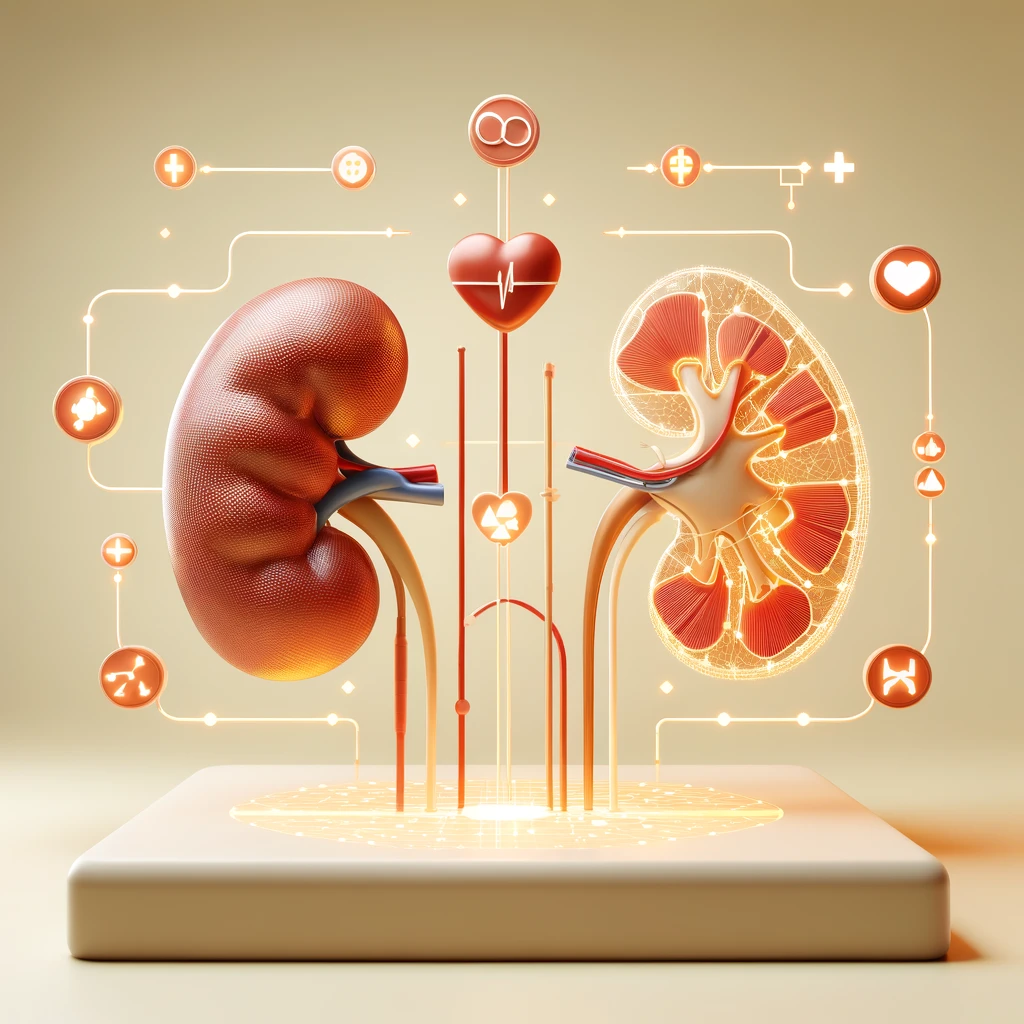
Chronic Kidney Disease (CKD) and heart failure are interrelated conditions that frequently coexist, creating a complex clinical scenario often referred to as the cardiorenal syndrome. The interplay between these two diseases significantly impacts patient outcomes, making their management particularly challenging.
Pathophysiological Mechanisms Linking CKD and Heart Failure
The relationship between CKD and heart failure is bidirectional: CKD can precipitate heart failure, and heart failure can accelerate the progression of CKD. Several interconnected pathophysiological mechanisms underlie this relationship:
- Hemodynamic Changes: In CKD, fluid retention and volume overload increase the preload and afterload on the heart, leading to left ventricular hypertrophy and eventual heart failure. Conversely, reduced cardiac output in heart failure leads to renal hypoperfusion, reducing the kidneys’ ability to excrete sodium and water, thereby worsening CKD.
- Neurohormonal Activation: Both CKD and heart failure are characterized by the activation of the renin-angiotensin-aldosterone system (RAAS) and the sympathetic nervous system (SNS). This activation contributes to vasoconstriction, sodium retention, and adverse cardiac and renal remodeling, perpetuating a cycle of worsening heart and kidney function.
- Inflammation and Oxidative Stress: Chronic inflammation and increased oxidative stress are common in both CKD and heart failure. These processes contribute to endothelial dysfunction, fibrosis, and further damage to cardiac and renal tissues.
- Anemia: Anemia is prevalent in CKD due to reduced erythropoietin production by the damaged kidneys. Anemia exacerbates heart failure by increasing myocardial oxygen demand and reducing oxygen delivery, thus impairing cardiac function.
- Uremic Toxins: Accumulation of uremic toxins in CKD patients contributes to myocardial fibrosis and dysfunction. These toxins also promote inflammation and oxidative stress, further damaging both the heart and kidneys.
Clinical Implications
The coexistence of CKD and heart failure significantly complicates the clinical management of patients due to overlapping symptoms and the potential for adverse interactions between treatments. Patients with both conditions often present with:
- Fluid Overload: Manifesting as edema, pulmonary congestion, and hypertension, fluid overload is a common issue that requires careful management to avoid exacerbating either condition.
- Electrolyte Imbalances: Disturbances in potassium, sodium, and magnesium levels are frequent, necessitating close monitoring and adjustment of medications to prevent arrhythmias and other complications.
- Medication Challenges: Many medications used to treat heart failure, such as ACE inhibitors, ARBs, and diuretics, can affect kidney function. Similarly, treatments for CKD, like phosphate binders and erythropoiesis-stimulating agents, can impact cardiovascular health. Finding a balance between managing both conditions is critical.
- Increased Morbidity and Mortality: Patients with both CKD and heart failure have higher rates of hospitalization, lower quality of life, and increased mortality compared to those with either condition alone.
Management Strategies
Effective management of patients with both CKD and heart failure requires a multidisciplinary approach, focusing on optimizing treatment for both conditions while minimizing potential adverse effects. Key strategies include:
- Fluid Management: Careful management of fluid status is crucial. Loop diuretics are often used to control fluid overload, but their doses need to be adjusted based on renal function and electrolyte levels. Monitoring weight and fluid intake/output helps in titrating diuretic therapy.
- Blood Pressure Control: Achieving optimal blood pressure control is essential for both heart and kidney health. ACE inhibitors or ARBs are preferred due to their benefits in reducing proteinuria and cardiovascular mortality, but renal function and potassium levels must be closely monitored.
- Neurohormonal Blockade: Beta-blockers and mineralocorticoid receptor antagonists can improve outcomes in heart failure patients. However, in CKD patients, careful dose adjustments and monitoring for hyperkalemia and worsening renal function are necessary.
- Anemia Management: Treating anemia with erythropoiesis-stimulating agents and iron supplementation can improve symptoms and reduce the burden on the heart. However, treatment goals should be individualized to avoid excessive hemoglobin levels, which can increase cardiovascular risk.
- Addressing Mineral and Bone Disorders: Managing hyperphosphatemia, secondary hyperparathyroidism, and vitamin D deficiency is critical in CKD patients to prevent cardiovascular calcification and bone disease.
- Multidisciplinary Care: A team approach involving nephrologists, cardiologists, dietitians, and other healthcare professionals is essential to provide comprehensive care. Regular follow-up and patient education on medication adherence, diet, and lifestyle modifications are vital for managing these complex patients.
Conclusion
The interplay between CKD and heart failure presents significant challenges due to their intertwined pathophysiological mechanisms and overlapping clinical manifestations. Effective management requires a comprehensive, multidisciplinary approach that addresses the unique needs of each patient.
Quiz
Please note that our articles are not intended to guide personal health decisions.
This content has been curated by Renes Care. Unauthorized use or reproduction is prohibited.
© Renes Care. All rights reserved.
